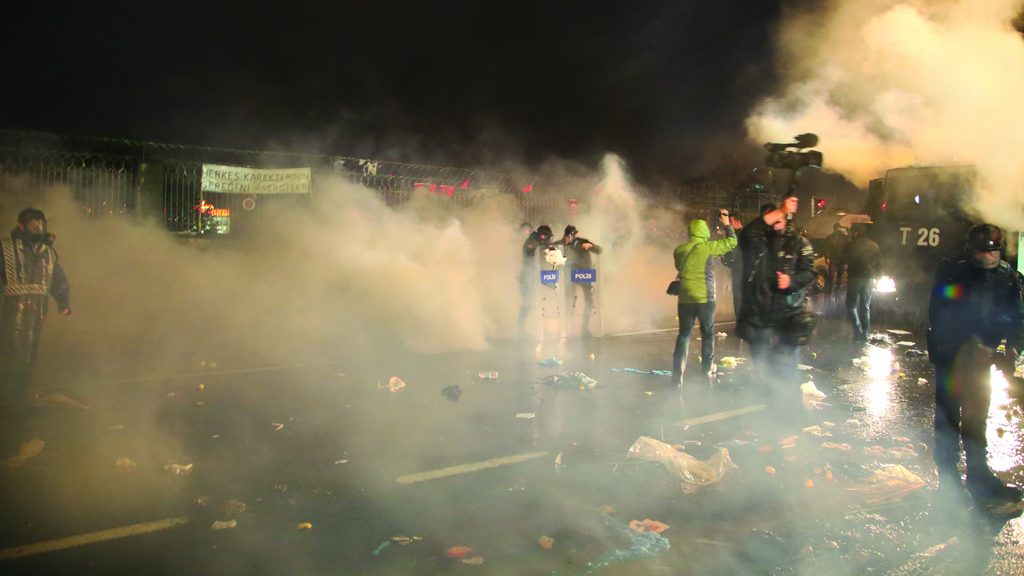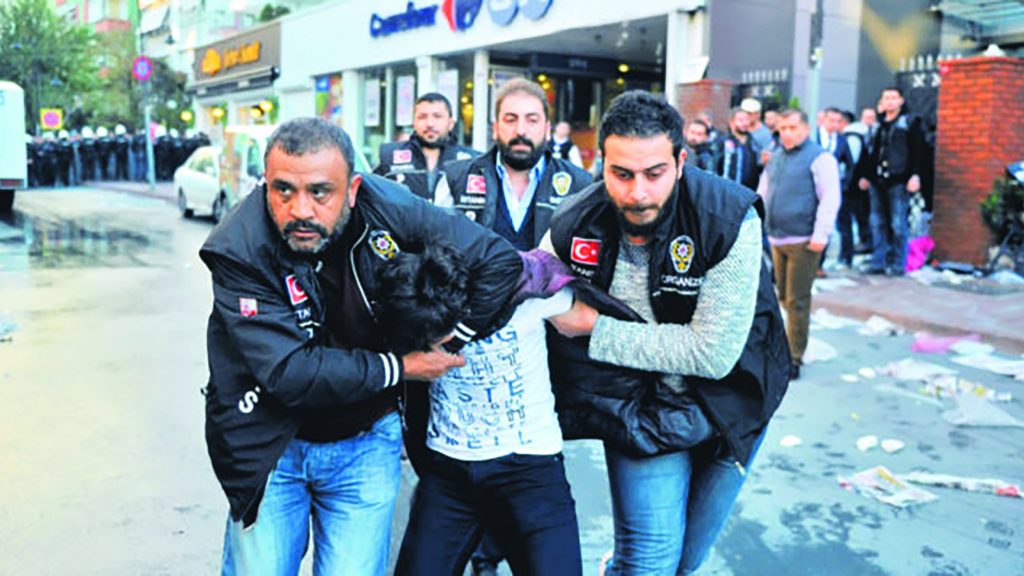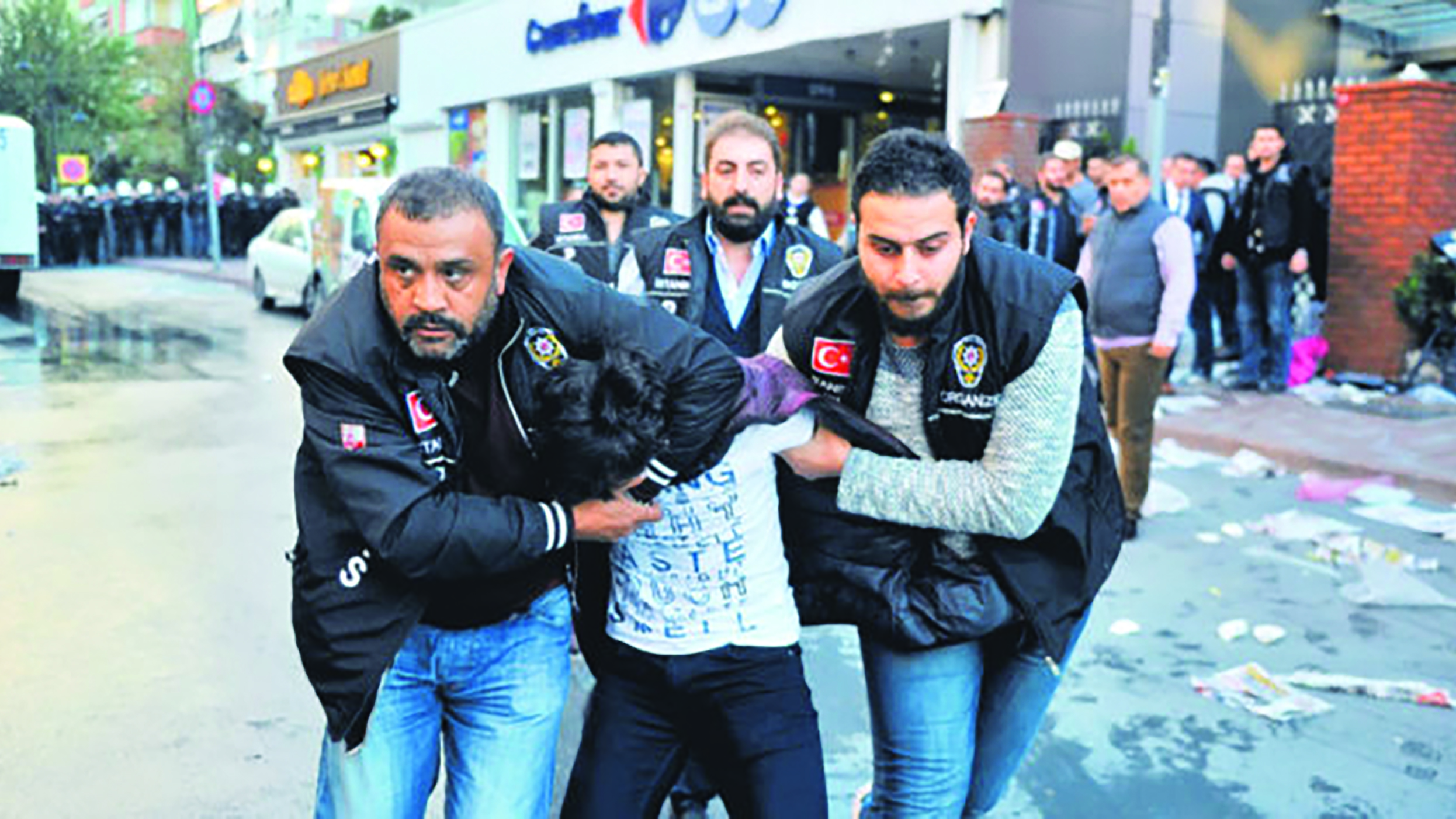By Nur Dogan
There was a time when journalists in Turkey could report the news freely, not knowing in the coming years, they would be silenced. That they would lose their freedom, while some would be detained, others were forcibly exiled. What happened to journalists in Turkey during the Justice and Development Party (AKP) rule?
On Dec. 17, 2013, citizens tuned in to their televisions to watch the morning news. They were all, no matter what channel they were watching, greeted by the same headline.
“An enormous corruption operation to the sons of four ministers and some businessmen in the government’s circle, they have been detained!” The accusations included money laundering, bribery and corruption. Eight days later, on Christmas Day, Prime Minister Erdogan’s son, Bilal Erdogan, was called to testify as a suspect.
He ignored the call.
It was a landmark for Turkish media. In the aftermath of the operation, Erdogan began threatening media companies in his live broadcast speeches. Any reporter who asked about the corruption in the Prime Minister’s press conferences was immediately fired due to pressure from the PM’s office. Knowing he could not handle every journalist one by one, Erdogan cut all opposing news media loose.
Events like this, along with countless others during Erdogan’s control of the country, have made Turkey one of the worst countries in the world to be a journalist. Reporters Without Borders ranks it 154 out of 180, behind countries like Russia and Iraq.

Another of Erdogan’s attacks on the media took place in 2016 when a host of news outlets were shut down, and almost 300 reporters were jailed simply for criticizing the government. Some of those jailed journalists died of cancer in prison. Those who were lucky, including myself, could flee Turkey and still write and broadcast news from countries abroad.
Nokta magazine was one of the outlets on Erdogan’s blacklist. Former Nokta Editor-in-Chief Cevheri Guven fled to Germany. In an interview, he shared about times when he was still living under the regime.
“Firstly, economic pressures started, and then publications were blocked many times with confiscation decisions,” Guven says.
“However, because we did not change our line despite the obstacles, we were detained and arrested together with my assistant Murat Capan on the morning of the Nov. 1, 2015 elections.”
The government frequently targeted the magazine to close down in 2015. The situation got intense after an issue was released with a cover featuring President Erdogan taking a selfie in front of murdered soldiers’ coffins.
Turkey has made it so the core responsibilities of journalists – writing the truth, reporting on politics- are considered criminal activities, or even terrorism. Arrested journalists were subjected to psychological violence after being detained.
“When we were arrested, I was taken to prison in a police vehicle playing the Erdogan anthem,” Guven says. “Thus, the message was given that it was Erdogan, not the judges, who actually arrested me. We were kept in a solitary cell. Even meeting with my assistant Murat Capan was prevented. Isolation was harnessed as a form of punishment. About six months later, I was released from prison, and an arrest warrant was reissued against me. I had to go on a refugee boat ride with my family and move to Greece.”
Guven’s passport was cancelled, and the police were looking for him across the country.
“My journalist wife was also dismissed because she was on the blacklist. Police broke into my house and searched for me. I had to leave Turkey. A few months after arriving in Greece from Turkey, they were sentenced to 25 years of jail time. I would spend my life in jail held in Turkey if I were there,” he says.
Turan Goruryilmaz, a former reporter and anchor for Bugun TV in England, was one of the victims of this ongoing persecution of independent reporters. The media channel he worked on was shut down during a live broadcast being watched by millions.
“Hundreds of police officers raided Koza-Ipek Media Group at dawn in October 2015. I still remember it like it was yesterday. My coworkers formed a barrier at the entrance door of the building,” Goruryilmaz says. “Nobody wanted the police to enter the building. While some were yelling that this was unconstitutional, others watched [the raid] helplessly and in tears. I was trying to reflect everything to Turkey, despite the tear gas sprayed in my face. Our door was broken, and then our building was evacuated. We were kicked out.”

Some parliamentarians from the main opposition party, including Baris Yarkadas, Eren Erdem, and Mahmut Tanal, rushed to support the journalists. “The MPs were also assaulted alongside media workers. I continued the broadcast until our live cable was cut by police,” Goruryilmaz says.
“The ‘Press is free and [freedom of journalism] cannot be prevented’ clause was violated before the eyes of Turkey. And, of course, we were left jobless. In recent years, being jobless in Turkey is a journalists’ destiny,” he says.
The Turkish government does not allow any amount of freedom of expression. The authorities sued many journalists who were criticizing Erdogan on social media. Some reporters chose obedience to survive while many others chose to be the public’s voice despite the threat of violence, detention and exile.
Sevgi Akarcesme, former editor-in-chief of Today’s Zaman, lives in the U.S. after being exposed to the Erdogan regime’s threat.
“Today’s Zaman was accused of supporting terrorism, and the government seized the entire media group on March 4, 2016,” Akarcesme says. “Clearly, these were fabricated charges.
“I was sentenced to a suspended prison term in 2015 after then-PM Ahmet Davutoglu sued me over comments someone else left under my tweet about him. President Erdogan also sued me over allegedly insulting him because I wrote about corruption implicating him and his family,” she says.
There were only two options for Akarcesme: stay in Turkey, get arrested for an unknown amount of time and risk being tortured, or flee Turkey and keep reporting the truth from abroad.
“A ‘court’ decision in 2016 seized all my assets in Turkey and there [was] a wanted warrant about me sent to Belgian authorities in 2016 since I fled there first,” Akarcesme added, saying the key to security is simply falling in line with the government.
“The regime rewards those who are loyal to itself by providing jobs, status and other benefits. For critical ones, there is no choice but to flee if they want to speak out. If they are not already jailed, they are unemployed and cannot pursue independent journalism,” she says.
According to the Turkish Ministry of Family, Labor and Social Services statistics from July 2019, 11,157 journalists were unemployed. The press cards of 3,804 journalists have been cancelled in the last five years.
“The regime resorts to measures ranging from arresting journalists to unlawfully seizing their properties and/or intimidating the family members of journalists,” Akarcesme says.
Thinking beyond the authority`s expectations has become a security threat to opponents and independent journalists. The Turkish government has been very successful in keeping the media under control, meaning only those willing to submit to Erdogan are allowed to continue working.
“Control over the media was first conducted using economic instruments. Huge advertising budgets were allocated to some media outlets from public sources while the media opposing the government have been subjected to significant cuts from those ad budgets,” Guven says.
The government cut dissenting platforms off of revenue by putting pressure on the businessmen who advertised in the opposition’s media.
“Media bosses were forced to leave the sector by selling their media outlets to the companies pointed out by the government. Reporters and writers targeted by the government were fired under pressure. Despite everything, some media organizations resisted, but when the independence of the judiciary, as well as media independence, was destroyed, the arrests of journalists began,” Guven says.
Journalists were arrested first, then opposition media organizations were seized on the accusation of terrorism. Journalists critical of the government were beaten and shot by fanatical Erdoganists.
The suppression got worse after the 2016 attempted coup in Turkey by a faction of the Turkish Armed Forces. Its failure only allowed Erdogan’s influence to grow, giving him the ability to brand the journalists he could not put in his pocket as terrorists.
“We can say that the AKP government aims to control all media. If the media was free in Turkey, the public could have been informed on corruption, illegalities and false politics,” Goruryilmaz says. “Today, there is barely any media group that can freely and independently broadcast in Turkey. The newspapers have become the government’s and Tayyip Erdogan’s press releases.”
Leaving the country with the hopes of reporting from across the border doesn’t even guarantee safety, as Guven learned.
“As long as I lived in Greece, the Turkish government made an effort to learn my home address. Turkey’s Ambassador to Athens, Greece has officially filed an extradition claim for my family and me,” he says. “My mother and father were detained, and my address in Greece was asked.”
For this reason, he and his family had to move to Germany. They were constantly exposed to threats and insults on the internet, but this did not prevent them from reporting. He and his colleagues established Bold Medya in exile. They kept publishing news on YouTube and their website.
This was not an ending but a new start. They have not obeyed the Erdogan regime because the first obligation of journalists is to tell the truth. Their job is reporting, revealing the facts and bringing the truth to the public. Journalism is not a crime, and arrested journalists must be released all over the world.

